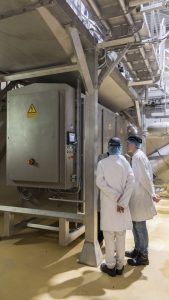The Pulsed Electric Field (PEF) treatment employs a high-voltage electric field to create pores in the cell structure. Its applications come with a range of advantages, such as increasing product yield, extending shelf life, preserving juice color, and improving extraction processes, to name a few.

Beyond the known effects and applications, PEF holds promising potential in other areas worth exploring. One such example is extraction, where PEF-induced cell pores contribute to enhanced extraction rates. Investigating whether this ability can be reversed, specifically to increase water absorption, is the focus of a study in beer production.
The brewing process for beer, while varying based on desired flavor characteristics, follows similar fundamental steps. Malting involves barley soaking (steeping), germination, and drying to produce malt, followed by subsequent steps for wort extraction and boiling, and then fermentation, maturation, and filtration.
Although beer production has seen numerous improvements throughout its history, the goal remains better product quality and more efficient production. Positive progress and research continue, including exploring emerging technologies to increase productivity and save energy without compromising the final product’s quality.
Research into Pulsed Electric Field technology’s effects on soaking and subsequent impacts on barley grain germination during malting has been conducted.

Soaking
A recent study delves into the influence of PEF technology on the water absorption rate of barley grains during the soaking phase of the brewing process.
The study reveals that barley grains treated with PEF exhibit a significantly higher moisture percentage compared to control grains (without PEF treatment). The absorption rate is also faster, reaching a moisture content of 42.2% in less time than the control grains.
PEF shows the potential to expedite the soaking process, potentially reducing water usage if a second soaking phase can be avoided.
Germination
Further exploration of the impact of PEF treatment during barley grain soaking evaluates whether it adversely affects barley grain germination, necessitating a halt before germination goes too far.
According to grain count, PEF treatment does not show a significant impact on barley germination after soaking, within a specified time period.
Our research results indicate that PEF processing has the potential to increase malt speed and yield, with a certain potential to reduce malt water consumption without affecting germination.
Members can access complete details, discoveries, and conclusions through the research report. This includes studies on barley soaking and germination discussed in this article, along with related research on PEF’s impact on microbial inactivation in wheat grains.
Explore the benefits PEF brings to your processes and products We are enthusiastic about exploring various established and new methods utilizing non-thermal technologies in food and beverage manufacturing. With an array of available on-site equipment, we can support businesses in exploring where different technologies can benefit their processing.
We can assist food and beverage companies in exploring existing and emerging applications of PEF for their product applications.
